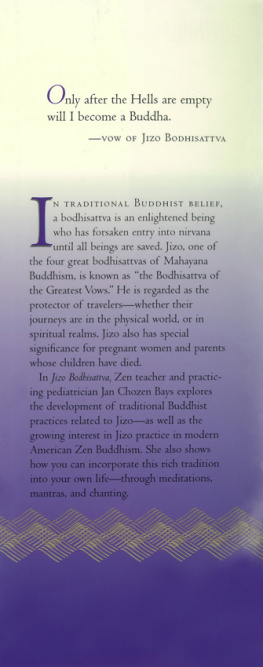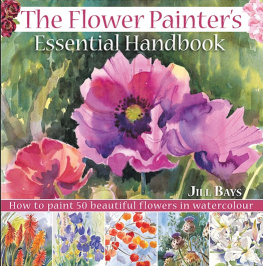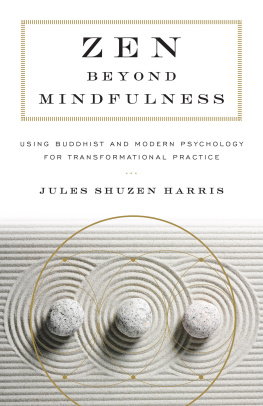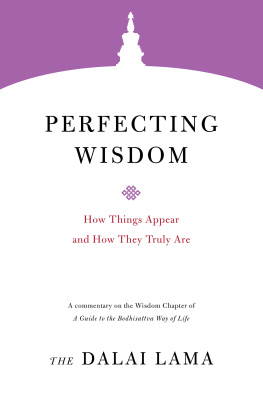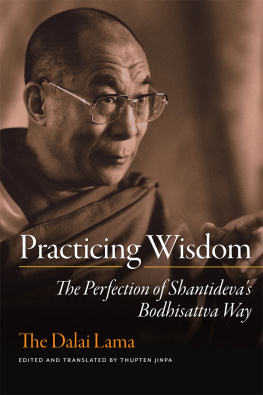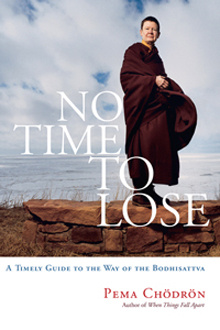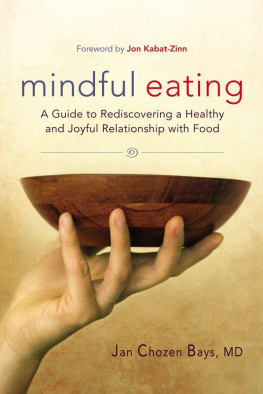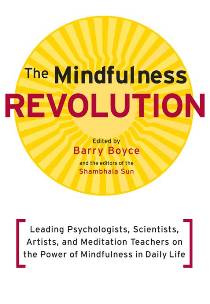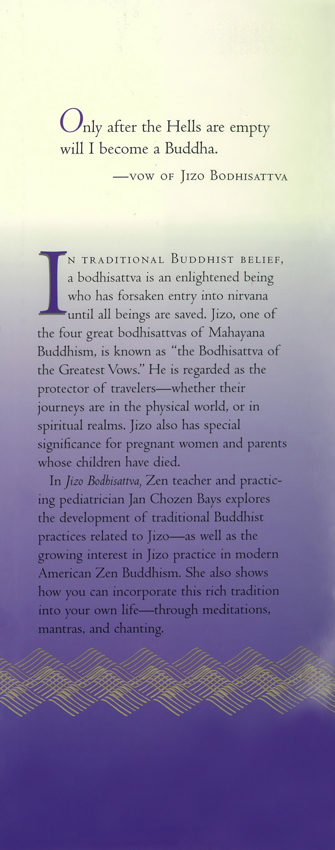Jizo
Bodhisattva
Modern Healing & Traditional Buddhist Practice

Jizo Bodhisattva seated on a lotus, holding a ring staff and cintamani jewel. An offering to the Three Treasures by a Taiwanese artist.

First published in 2002 by Tuttle Publishing, an imprint of Periplus Editions (HK) Ltd, with editorial offices at 364 Innovation Drive, North Clarendon, VT 05759 U.S.A.
Copyright 2002 Jan Chozen Bays
All rights reserved. No part of this publication may be reproduced or utilized in any form or by any means, electronic or mechanical, including photocopying, recording, or by any information storage and retrieval system, without prior written permission from Tuttle Publishing.
Permission acknowledgments for use of previously published material are set out on page .
Library of Congress Cataloging-in-Publication Data
Bays, Jan Chozen.
Jizo Bodhisattva: modern healing and traditional Buddhist practice / by Jan
Chozen Bays.- 1st ed.
p.cm.
Includes bibliographical references.
ISBN 0-8048-3189-0; ISBN 978-1-4629-1805-8 (ebook)
1. Ksitigarbha (Buddhist deity)-Cult. I. Title.
BQ4710.K73 B39 2001
2943'431-dc21 2001035136
Distributed by
North America, Latin America, Europe
Tuttle Publishing
Distribution Center
Airport Industrial Park
364 Innovation Drive
North Clarendon, 05759-9436
Tel: (802) 773-8930
Toll free tel: (800) 526-2778
Fax: (802) 773-6993
Toll free fax: (800) 329-8885
Japan
Tuttle Publishing Japan
Yaekari Building 3rd Floor, 5-4-12
Osaki Shinagawa-ku,
Tokyo 141-0032
Tel 81 (03) 5437 017
Fax 81 (03) 5437 0755
Asia Pacific
Berkeley Books Pte. Ltd.
61 Tai Seng Avenue, #02-12
Singapore 534167
Tel: (65) 6280 1330
Fax: (65) 6280 6290
Email:
First edition
07 06 05 04 03 02 01 10 9 8 7 6 5 4 3 21
Printed in the United States of America
Designed by Dede Cummings Designs
At the time of his death the Buddha said, I have worked hard for many kalpas to liberate obstinate living beings. Those who have not yet understood the Dharma will surely fall into states of suffering.
Kshitigarbha Bodhisattva said, Even if their good deeds are as little as a hair, a drop of water, a grain of sand, a mote of dust, or a bit of down, I shall gradually help living beings to liberation. World Honored One, do not feel distressed over beings in generations to come. He repeated this vow three times.
Shakyamuni Buddha was delighted and said, My blessings. I appreciate your strong vows and praise you for your efforts to heal the human world. When you fulfill this great vow after many kalpas, you will become a Buddha.
From the Sutra of the Past Vows of Earth Store Bodhisattva
Dedication
This book is dedicated to every reader. May your practice with Jizo Bodhisattva become a strong staff to support you in your pilgrimage through this life. May you awaken to the pure bright mind and open benevolent heart that have been yours since before you were born. May the benefit of your practice radiate to all whom you meet. May you live in happiness and at ease.
Contents
One: |
Two: |
Three: |
Four: |
Five: |
Six: |
Seven: |
Eight: |
Nine: |
Ten: |
Eleven: |
Twelve: |
Thirteen: |
Foreword
THE Earth Store Sutra
Japanese Buddhist pilgrims, as Roshi Chozen Bays tells us in her remarkable book, brought Jizo Bosatsu, with his compassion and saving graces, back to Japan from China. Chinese Empress Wu Zetien (624-705), despite her reputation for ambition and ruthlessness, was nonetheless a devout Buddhist laywoman. Monks visiting the Tang Court from India spoke of a longer edition of a popular scripture, the Flower Adornment (Avatamsaka) Sutra, and she wanted to read it. She promised to reward any pilgrim who could deliver the text, in Chinese translation, into her hands. The Khotanese translator Master Shikshananda, Joy Of Learning (seventh century), did just that. He brought a palm-leaf manuscript of the Flower Adornment Scripture to the Tang Court where he skillfully turned the Sanskrit into Chinese. The empress assembled hundreds of scholar-monks and attended the translation sessions herself.
Before returning to Khotan, Shikshananda brought forth from his monks bag a copy of the Sutra on the Past Vows of Earth Store Bodhisattva and asked permission to translate it as well. The stories of Earth Store (Jizo) Bodhisattva began in China with that text.
The narratives tell of great vows by heroic women; adventures of courageous children who make fearless sacrifices to repay their debt of kindness to their parents; graphic, gory accounts of the hells and sublime tales of the heavens. We find practical advice for the spiritual aspects of childbirth, interpretation of dreams, and guidelines for avoiding rebirth in the evil destinies of animals, ghosts, and the hells.
Now Jizo Bosatsu, along with this timeless epic narrative, has come to the West.
The Bodhisattva with the Greatest Vows
His name in Sanskrit is Kshitigarbha. The name Earth Store could also be translated into English as Earth Treasury, or Earth Storehouse. Earth Store, like its Japanese equivalent, Jizo, and the Chinese Ti-tsang, is a quick two syllables, easy to chant in one breath, and easy to remember.
Earth Store, one of the four great bodhisattvas of the Mahayana, is known as the bodhisattva with the greatest vows. His two unforgettable vows are
Only after the Hells are empty will I become a Buddha and
Only after all beings are taken across to Enlightenment will I myself realize Bodhi.
Implied in these vows is the assertion that although Earth Store has the wisdom and the virtue necessary to become a Buddha, he chooses instead to postpone his own liberation until all beings have been safely rescued from the evil destinies. Only when they reach nirvana, will Earth Store fulfill his vows. Since living beings are busy creating offenses nonstop, Earth Stores duties in the hells are likely to extend into the infinite future. Such unimaginable courage and compassion are what makes his vows particularly great.
Womens Relationships with Their Mothers
I was a graduate student when I first heard stories of Buddhist women heroes in the Mahayana tradition. I read the story of Gangadevi, The Goddess of the Ganges, a Buddhist female saint. Gangadevi, like Kuan-yin Bodhisattva in the Lotus Sutra, had made a rich offering to the Buddha and in turn had received a prediction to enlightenment. Predictions to enlightenment mark a major turning point in ones cultivation of the bodhisattva path.
Gangadevis prediction caused some of the less-accomplished Arhat disciples to grumble. How could a mere maiden win the most sublime prize: a prediction to Buddhahood, when that goal has eluded us, the real disciples, for so long? they complained.

